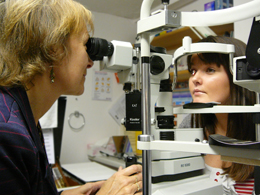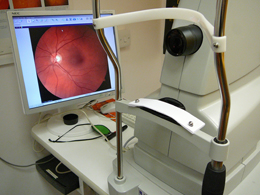Eye Examinations
Our eyesight usually changes and deteriorates very gradually throughout life, such that we don’t immediately notice when our sight is not quite as good as it should be.
As with our body generally, our eyesight can be something we take for granted, until a sudden or drastic change occurs.
Regular eye examinations help in two main areas:
- Vision assessment – In the eye examination, your eyes’ quality of vision and corrective prescription are measured and compared to previous results. From these measurements, the optometrist can give professional recommendations to you, to help you get the clearest possible vision. He/she might recommend spectacles or contact lenses for general or specific use, or an update to your existing spectacles/lenses if your prescription has changed significantly.
- Eye health – We recommend our extended Premium examination to our new patients and then again at subsequent appointments. This includes retinal photography which can reveal medical eye conditions in their early stages, so that – with the right management – we can minimise the risk of the drastic sight loss that may occur if conditions are left untreated. Our latest digital camera can also develop your risk of developing age related macular degeneration.
Children’s eye examinations
Eye examinations for children are especially important for a number of reasons. Read more here >>
The NHS advises adults to have an eye examination, at least every two years and children should be checked annually. However, in some circumstances, your optometrist may recommend more frequent examinations, for example, if you:
- have diabetes
- are 40 or over and have a family history of glaucoma
- are 70 or over
- have a mild eye condition, that requires monitoring
See our fees and charges here >>
At Patricia Hayselden & Partners, we conduct thorough NHS and private examinations in a friendly, relaxed atmosphere, taking the time to listen to your needs and to answer your questions. Our determination to provide the best care is also demonstrated in our investment in high-quality diagnostic/analysis equipment, such as our fundus camera and slit lamp camera.
 Some of our equipment might look scary, but it really isn’t – and it helps us give you the best possible measurement and examination.
Some of our equipment might look scary, but it really isn’t – and it helps us give you the best possible measurement and examination.

If you are diabetic, you will be advised by Oxfordshire Diabetic Eye Screening Service (ODESS), to have the blood vessels at the back of your eye photographed each year, to look for any eye complications, caused by diabetes. We are an ODESS accredited practice and the cost is covered by the NHS. You can have this eye screening done as a separate consultation or as part of your annual eye examination.